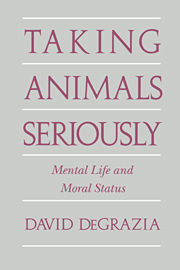Book contents
- Frontmatter
- Contents
- Acknowledgments
- 1 A short primer on animal ethics
- 2 The coherence model of ethical justification
- 3 Animals' moral status and the issue of equal consideration
- 4 Motivation and methods for studying animal minds
- 5 Feelings
- 6 Desires and beliefs
- 7 Self-awareness,language,moral agency,and autonomy
- 8 The basics of well-being across species
- 9 Back to animal ethics
- Index
8 - The basics of well-being across species
Published online by Cambridge University Press: 05 June 2012
- Frontmatter
- Contents
- Acknowledgments
- 1 A short primer on animal ethics
- 2 The coherence model of ethical justification
- 3 Animals' moral status and the issue of equal consideration
- 4 Motivation and methods for studying animal minds
- 5 Feelings
- 6 Desires and beliefs
- 7 Self-awareness,language,moral agency,and autonomy
- 8 The basics of well-being across species
- 9 Back to animal ethics
- Index
Summary
Having done our homework on animal minds in Chapters 4,5,6, and 7, we can use much of what we learned as we return in this chapter to questions of value—this time, to interspecific value theory. Our task involves prudential value theory (value theory, for short). This is the study of well-being, or the good of individuals in a familiar nonmoral sense, at the most general and ultimate level. In contrast to ethics, value theory examines value from the self-interested perspective of an individual. What constitutes her good or well-being? What, ultimately, makes her life go better or go worse? Rather than confining our investigation to humans, we will broaden it in an effort to understand well-being generally and therefore across species. As we will see, any serious effort to do so will draw significantly from what we know about animal minds.
WHY THIS CHAPTER?
Exploring well-being across species is necessary for understanding what benefits, and what harms, animals. If the matters of benefit and harm to animals appear straightforward, appearances are deceiving. Consider an undomesticated dog living in the wild during winter. Food is somewhat scarce. We domesticate the dog and feed him well but keep him inside except for brief walks. He is often bored but hardly suffers. Has he been benefited, on balance? In the wild, let us say, he would exercise his native capacities much more but would also suffer more.
- Type
- Chapter
- Information
- Taking Animals SeriouslyMental Life and Moral Status, pp. 211 - 257Publisher: Cambridge University PressPrint publication year: 1996
- 2
- Cited by



